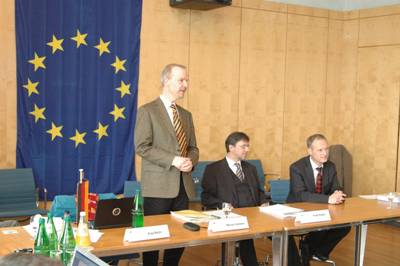Newsletter
- Issue VIII / November 2013
- Issue VII / June 2013
- Issue VI / February 2013
- Issue V / June 2012
- Issue IV / November 2011
- Issue III / July 2011
- Issue II / January 2011
-
Issue I / September 2010
- Editorial: Welcome note by Werner Sommer, representative of the Lead Partner
- A successful start for EnercitEE
- The sub-project priorities and the 1st Call for Proposals
- Regional kick-off events
- An introduction to Saxony
- An introduction to Smaland (Kalmar and Kronoberg)/Blekinge
- An introduction to Emilia-Romagna
- An introduction to Haute-Savoie
- An introduction to Crete
- An introduction to Lower Silesia
- EnercitEE: An overview
- Information and materials
Editorial: Welcome note by Werner Sommer, representative of the Lead Partner
For most people, the greatest challenge facing climate policy today is the protection of natural resources and the global climate. For this reason it has become necessary to use energy more efficiently and to place more importance on renewable sources within the energy mix. Local authorities play a key role in this process. The scope of their functions provides them with numerous opportunities to exert their influence on energy production and consumption.
Werner Sommer (standing) and next to him the Saxon State Minister for the Environment and Agriculture Frank Kupfer
This is why we want to provide the local authorities, who represent one of the key actors of the EnercitEE project, with the appropriate instruments to expand upon their potential for energy saving and to achieve not only ecological but also economical results, e.g. by relieving financial pressure on private households and boosting the regional economy. Another central target group are the citizens. Citizens need to get more aware of their important role in remarkably reducing CO2 emission. They need to understand the potentials of saving energy and how to improve the energy performance within their daily lives.
The regions that have agreed to participate include Smaland (Kalmar and Kronoberg)/ Blekinge (Sweden), Emilia-Romagna (Italy), Haute-Savoie (France), Crete (Greece) and Lower Silesia (Poland). The Lead Partner of the EnercitEE project is Saxony (Germany). Over the past couple of months, we have established a loyal and constructive cooperation and we look to the future with confidence. Each participating region has defined specific interests and focuses. However, all partners are united in their effort to strengthen the energy efficiency of local authorities and citizens and to contribute to greenhouse gas mitigation.
A project with six European partner regions requires a clear structure, detailing responsibilities and arrangements. The Steering Group, which consists of political representatives from the participating regions, is the decision-making body within EnercitEE. The decisions that have to be made are prepared by the Working Group, which consists of representatives from the energy agencies or other authorities that are involved. The Saxon State Office for Environment, Agriculture and Geology hosts the Mini-Programme Coordination Office. As Lead Partner, Saxony is responsible for the sound implementation of the entire project. We will keep the public up-to-date about the progress of the project through the press, our website www.enercitee.eu, and at various events.
Our challenge – meaning the challenge of all partners being involved in EnercitEE and its sub-projects – is to take a particular active role in promoting more energy efficiency. We will facilitate the knowledge exchange on a regional and local level. Moreover, we will transmit the identified successful measure and policies to national and European level. Last but not least, we want to learn from the experiences of others and to impart the expertise that we have gained ourselves.
I hope that the project structure ensures a successful implementation of EnercitEE and that the results of EnercitEE will help other stakeholders to consider and employ energy efficiency measures. Let us work together and join our forces to achieve the goals of EnercitEE and to endorse sustainability.

